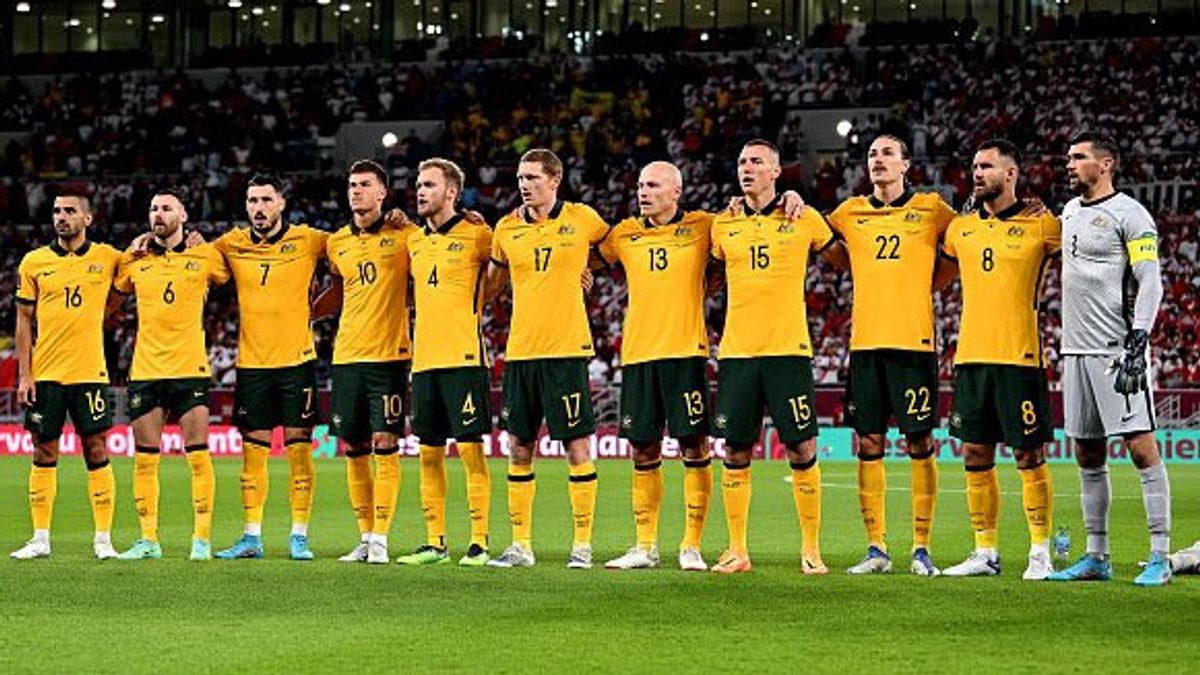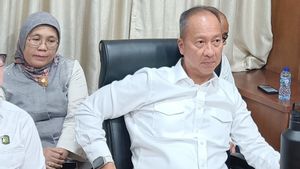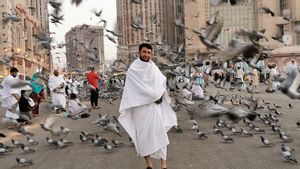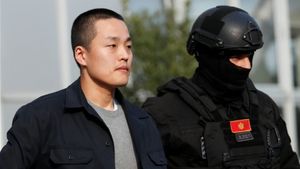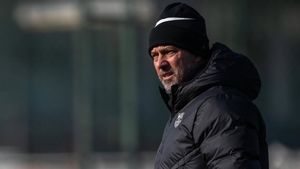JAKARTA - The Australian men's national football team is controlled by football's governing body in Australia, Football Australia, which is affiliated with the Asian Football Confederation (AFC) and the regional ASEAN Football Federation (AFF).
Australia are the only national team to have won two confederations, having won the OFC Nations Cup four times between 1980 and 2004, as well as the 2015 AFC Asian Cup at home.
The team has represented Australia in the FIFA World Cup tournament six times, in 1974 and from 2006 to 2022. The team has also represented Australia in the FIFA Confederations Cup four times.
👏 Congratulations @Socceroos on #WorldCup qualification ️ What a campaign - 1008 days and 20 matches (four at home) ️🦘 And what a way to celebrate this week's 100th anniversary of the national team pic.twitter.com/bb3KTLQRfX
— FIFA.com (@FIFAcom) June 14, 2022
Profile overview
Squad name: Australia national football team Nickname: Socceroos Association: Football Australia Confederation: OFC (Oceania): 1966–2006 AFC (Asia): 2006–present Sub-confederation: AFF (Southeast Asia) Head coach: Graham Arnold Team captain: Mathew Ryan Most Caps: Mark Schwarzer (109) Top scorer: Tim Cahill (50) Home stadium: Various FIFA Code: AUS Colour: Yellow and green NicknameThe Australian nickname, "Socceroos", was coined in 1967 by Sydney journalist Tony Horstead in his coverage of the team on a tour of South Vietnam during the Vietnam War. The nickname represents the cultural predilection for the colloquial use of the country. It also represents the Australian English usage of the sport's name.
The name itself is similar to most other Australian national representative sports team nicknames; used informally when referring to a team, in the media or in conversation. Likewise with the name taken from the famous symbol of Australia, in this case the kangaroo. The words soccer and kangaroo are combined into the word 'portmanteau' as 'soccer-roo'; such as the Olyroos for the Australian Olympic football team or the Hockeyroos for the Australian women's national hockey team.
FIFA RankingThe Australian national team occupies 39th position in the FIFA rankings with 1483.73 points as of June 2022. The highest ranking was 14 in 2009, while the lowest was 102 in 2014.
World CupAustralia confirmed themselves to qualify for the 2022 World Cup after winning on penalties over Peru on June 14 last. This is the Socceroos' sixth successive World Cup success.
Australia's national team qualified for Qatar via a 5-4 penalty shootout win against Peru following a goalless draw in normal time at the Al Rayyan Stadium in Doha, Qatar.
Australia's substitute goalkeeper, Andrew Redmayne, became a hero. He saved Peru's last penalty which was executed by Alex Valera.
2022 World CupAt the tournament in Qatar later, Australia will enter Group D with France, Denmark and Tunisia.
Here is the schedule for their group stage matches:
Tuesday, 22 November 2022France vs Australia: 20:00 WIB Wednesday, 23 November 2022Denmark vs Tunisia: 02:00 WIB Saturday, 26 November 2022France vs Denmark: 17:00 WIBTunisia vs Australia: 23:00 WIB Wednesday, 30 November 2022Tunisia vs France: 22:00 WST Australia vs Denmark: 22.00 WIBAustralia's goalscorer in 2022 World Cup Qualifiers Jamie Maclaren 7 Harry Souttar 6 Mitchell Duke 5 Jackson Irvine 4 Mathew Leckie 4 Ajdin Hrustic 3 Adam Taggart 3 Martin Boyle 3 Awer Mabil 2 Aaron Mooy 2 Trent Sainsbury 1 Fran Karacic 1 Rhyan Grant 1 Tom Rogic 1 Craig Goodwin 1 Riley McGree 1 Provisional squad for the 2022 World CupIn our centenary year, we're ready to #GiveIt100 at another @FIFAWorldCup The Socceroos have done it. #AllForTheSocceros pic.twitter.com/eakA3X0SOT
— Socceroos (@Socceroos) June 13, 2022
Goalkeeper
Matthew Ryan Andrew Redmayne Danny Vukovicdefender
Nathaniel Atkinson Fran Karacic Ryan McGowan Joel King Bailey Wright Aziz Behich Trent Sainsbury Alex WilkinsonMidfielder
James Jeggo Connor Metcalfe Ajdin Hrustic Denis Genreau Gianni Stensness Ben Folami Kenny DougallStriker
Martin Boyle Nicholas D'Agostino Bruno Fornaroli Awer Mabil Mitchel Duke Marco TilioTrainerWe take a moment to recognize EVERYONE who played their part throughout an unforgettable qualifying journey 4️⃣8️⃣ players appeared throughout our 20 qualifiers, with 17 making their Socceroos debuts during that time. #GiveIt100 #AllForTheSocceros pic.twitter.com/Xj5YuNo4ZW
— Socceroos (@Socceroos) June 14, 2022
Born 3 August 1963, Graham Arnold is an Australian manager and former football player. Arnold was appointed assistant coach of the Australian national team in 2000. After head coach Frank Farina was sacked in 2005, Arnold worked with Guus Hiddink for the 2006 World Cup, where they qualified for the second round. After Hiddink left, he became interim coach of the Socceroos.
Arnold then qualified for the Australia U23 men's national football team ('Olyroos) to the 2008 Beijing Olympics. He then helped Pim Verbeek for the 2010 World Cup qualification in South Africa. In August 2018, Arnold was appointed head coach of the Socceroos - Australia's senior men's national football team.
Team captainArnie '93 Arnie '22.Graham Arnold has always had #GiveIt100 #AllForTheSocceroos pic.twitter.com/DmZaFLFrMR
— Socceroos (@Socceroos) June 20, 2022
Mathew David Ryan (born 8 April 1992) is an Australian professional footballer who plays as a goalkeeper for La Liga club Real Sociedad and the Australia national team.
Ryan made his senior international debut in 2012, and has since established himself as Australia's first-choice goalkeeper, effectively replacing his childhood idol Mark Schwarzer. He played in the 2014 and 2018 World Cups as well as the 2015 and 2019 Asian Cups, winning the Best Goalkeeper award at the 2015 tournament which his country won at home.
RecordWe Fucking did it! pic.twitter.com/ps9T1IZAJ4
— Maty Ryan (@MatyRyan) June 13, 2022
Australia currently holds the world records for the biggest win and most goals scored by a player in an international match. Both records were achieved in the 2002 World Cup qualifying match against American Samoa on April 11, 2001.
Australia won 31-0 with Archie Thompson scoring 13 goals and David Zdrilic scoring 8 goals. Two days before the 31–0 win, Australia broke the record for biggest wins with a 22–0 win over Tonga. With 13 and 8 goals respectively, Thompson and Zdrilic broke the previous record shared by another Australian, Gary Cole, who scored seven goals against Fiji in 1981, and Iran's Karim Bagheri, who also scored seven goals against the Maldives in 1997. .
AFC Asian Cup Trophy: 2015 OFC Nations Cup: 1980, 1996, 2000, 2004 AFC Men's Team of the Year: 2006, 2015 South Vietnam 1967 South Vietnam Independence CupThe English, Chinese, Japanese, Arabic, and French versions are automatically generated by the AI. So there may still be inaccuracies in translating, please always see Indonesian as our main language. (system supported by DigitalSiber.id)
